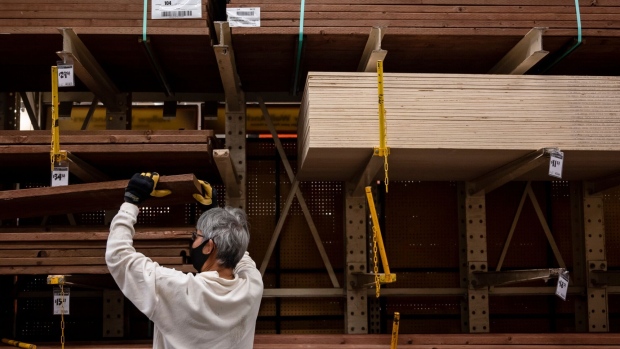Nov 9, 2023
Home Depot May Have Illegal African Wood in Its Doors, EIA Says
, Bloomberg News

(Bloomberg) -- More than a million doors made with illegally sourced Central African wood may have ended up on US retail shelves at companies including Home Depot Inc. due to lax supply chain oversight, an environmental group said.
At least 1.2 million doors sold to US consumers between 2017 and 2022 have a “high likelihood” of containing illegal okoume wood from Equatorial Guinea labeled as having originated in the Republic of Congo, the Washington- and London-based Environmental Investigation Agency said in a report Tuesday. The logs were exported to China, processed in Asia and imported by North Carolina-based door manufacturer Jeld-Wen Holding Inc., EIA said.
“Conversations with Jeld-Wen’s top four door skin suppliers confirm that the origins of the okoume logs are unclear” and a significant amount likely came from Equatorial Guinea, the EIA said in its report.
Mis-declaring the origin of timber imported into the US is a violation of law under the Lacey Act, which prohibits shipment of any illegally harvested plants or plant products into the country.
“We take these reports seriously and require our suppliers to follow all applicable laws and regulations of the United States, and those of the respective country of manufacture or exportation,” Jeld-Wen said in an emailed statement Tuesday.
The company continuously monitors reports of unethical and illegal behavior, Jeld-Wen said before the report’s release, adding that it has no evidence that “our suppliers have sourced okoume from Equatorial Guinea.” Jeld-Wen didn’t provide further comment after the report’s release.
Home Depot takes the allegations “seriously and have begun an investigation to ensure our suppliers are in compliance with The Home Depot’s wood purchasing policy and all applicable laws,” the company said after the release of the document.
Home Depot is the world’s largest home improvement chain and one of the largest retailers in the US. Jeld-Wen calls itself “one of the world’s leading manufacturers of reliable windows and doors” on its website.
Climate Impact
While okoume, a species of tropical hardwood, is not endangered, the International Union for Conservation of Nature lists the trees as “vulnerable” on its Red List of Threatened Species. Three of the four countries where the tree grows naturally — Gabon, Cameroon and Republic of Congo — have put extensive restrictions on log exports, including okoume.
The okoume that was used in Home Depot’s doors was potentially illegal for multiple reasons, according to the EIA. These include a ban on unprocessed log exports by Equatorial Guinea’s government between 2007 and 2020, covering part of the period under review, and the fact that they were declared as having originated elsewhere breached the Lacey Act.
Okoume is native to parts of the Congo Basin, the world’s biggest carbon sink, a reference to the ability of forests to absorb climate-warming carbon dioxide, and a key bulwark against climate change. Scientists are increasingly concerned about the destruction of the basin’s forests and tropical peatlands.
The country temporarily dropped its ban on unprocessed log exports in October 2020 during the Covid-19 pandemic. It extended this period in April 2023 for a further three years despite a recommendation to ban the practice by the Central African Economic and Monetary Community, of which Equatorial Guinea is a member.
Equatorial Guinea’s government “has always respected its international commitments and obligations” and complies with CEMAC recommendations regarding the export of timber, its embassy to the US said Wednesday in a response to questions.
Home Depot’s wood purchasing policy says it only accepts wood from the Congo Basin if it is certified by the Forest Stewardship Council. But, according to EIA, no FSC-certified okoume forests exist in Equatorial Guinea or Republic of Congo. The two countries made up almost 100% of China’s okoume imports from 2014 to 2021, EIA said.
©2023 Bloomberg L.P.


